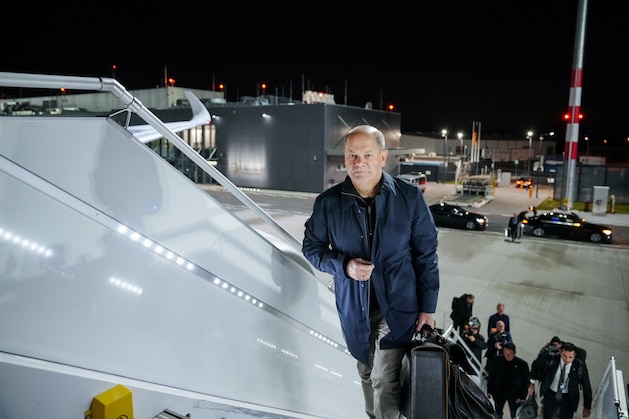Resignation in the cabinet and battle tank debate: After a very turbulent start to 2023, Chancellor Scholz is fleeing for the first time – with a new aircraft. But also in South America it will be about the turning point in the course of the Ukraine war.
Chancellor Olaf Scholz (SPD) left on Saturday with the new government plane “Konrad Adenauer” on his first trip to South America as head of government. The four-day journey begins in the Argentine capital, Buenos Aires, before continuing to Chile and Brazil. In terms of content, it is about the expansion of economic relations, energy supply and climate protection.
The “Konrad Adenauer” is the second aircraft of the type A350-900 that was put into service by the Bundeswehr’s flight readiness service at the end of last year. However, it is the first of a total of three of these aircraft that has full VIP facilities with offices and a lounge area – the Bundeswehr is silent on the details, however.
The “Adenauer” is thus considered to be the new “Air Force One” for the Federal Government and the Federal President. It had already been tested by Federal President Frank-Walter-Steinmeier on a trip to Brazil at the turn of the year. Scholz is now flying the white-painted aircraft with black, red and gold stripes for the first time.
The “Adenauer” is 67 meters long, 960 kilometers per hour, flies more than 13,000 meters high and can reach any destination in the world without a stopover. 14 hours were scheduled for the 12,000-kilometer route to Buenos Aires.
Scholz was already on the way to Buenos Aires with a plane called “Konrad Adenauer” – the predecessor of the current “Air Force One” type A340. In 2018, together with the then Chancellor Angela Merkel (CDU), he made his way to the G20 summit by plane, but shortly after take-off there was a serious breakdown. A defective component – a central switching unit in the on-board electronics – paralyzed two radio systems that are supposed to replace each other in an emergency.
The plane that started in Berlin had to turn back shortly after take-off. Merkel and Scholz switched to a Spanish airliner – and arrived a day late for the summit of the most important economic powers. The glitch caused a lot of ridicule, but also ensured that the Bundestag made around 1.2 billion euros available for new aircraft. The result is the three new A350 aircraft, including the “Konrad Adenauer”.
The Chancellor is visiting Latin America much earlier than his CDU predecessor Merkel, who only showed up on the continent two and a half years after taking office. The SPD politician has resolved to broaden Germany’s international relations as part of the turning point after the Russian attack on Ukraine, in order to avoid new dependencies on individual countries such as Russia and its gas once did. That is why the Chancellor has now been to Asia three times and has already completed a long trip to Africa.
In South America, Scholz is accompanied by a business delegation made up of a dozen managers and association representatives. Economically, Latin America is interesting, among other things, because of its raw material deposits. Iron and steel, copper, lead, zinc and, above all, lithium, which is so important for the manufacture of electric cars, can be found on the continent.
Among other things, the visit will deal with the stalled negotiations on a free trade agreement with the Mercosur countries, which include Argentina and Brazil. These two countries are also members of the G20 of major economic powers.
On Monday and Tuesday, Scholz ends his trip in Brazil, the largest and most populous country on the continent. There he will meet leftist President Luiz Inácio Lula da Silva, who was sworn in on January 1st and who prevailed in a runoff election in October against Jair Bolsonaro, also known as the “Donald Trump of the Tropics”.
Industry President Siegfried Russwurm called the trip “an important signal at the right time”. The head of the Federation of German Industries (BDI) is hoping for a new boost for the planned free trade agreement. Scholz should campaign for a quick agreement in Argentina and Brazil, he demanded. “We must not miss the opportunity to implement one of the most important projects on our bilateral trade agenda.” This would avoid 85 percent of European export duties to the region and thus several billion euros in taxes for companies every year.
The President of the Association of German Chambers of Industry and Commerce (DIHK), Peter Adrian, also called for ratification of the agreement with the Mercosur states and the agreements with Mexico and Chile. “Otherwise our economy would face competitive disadvantages, especially compared to the USA and China. We must not now fall further behind in our economic commitments in Latin America.”








